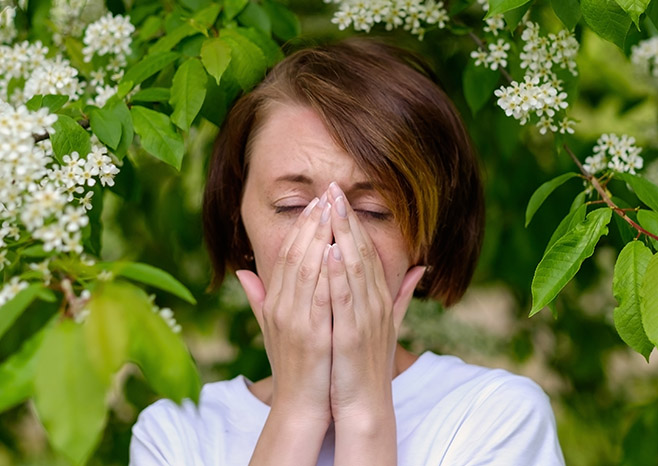
What is Allergic Rhinitis?
Allergic rhinitis occurs when someone breathes in a substance that they’re allergic to. The most common form of allergic rhinitis is pollen-driven seasonal allergies, also known as hay fever, but the condition can also occur when someone encounters substances like dust and animal dander.
What is Hay Fever?
Pollen carried in the wind from trees, grasses and weeds can cause hay fever, the most prevalent form of allergic rhinitis among those with a pollen allergy. The amount of pollen in the air affects the severity of the symptoms of allergic rhinitis. If it’s a hot, dry, windy day, more pollen will circulate, and on cool, damp days, hay fever is less severe because the pollen in the air is washed to the ground.
Symptoms of Allergic Rhinitis
Shortly after someone with allergic rhinitis comes into contact with the substance they’re allergic to, they may experience any of the following symptoms: itchy nose, skin, problems with smell, runny nose, sneezing or watery eyes. After initial contact is made, secondary symptoms may present themselves, like stuffy nose (nasal congestion), coughing, clogged ears, decreased sense of smell, sore throat, dark circles or puffiness under the eyes, fatigue, irritability, or headaches.
Diagnosis & Treatment
The good news is, symptoms of allergic rhinitis can be treated. If your symptoms are unmanageable, visit your doctor. Your doctor will ask when your symptoms occur seasonally, if your daily lifestyle exposes you to other allergens and if anyone else in your family has similar symptoms, as allergic rhinitis is often a hereditary condition. You may be asked to complete a skin or blood test to determine what is causing your symptoms.
Treating allergic rhinitis is usually managed with antihistamines, or in severe cases, allergy shots. Nasal washes have been found to be effective in managing symptoms, as they flush the sinuses of allergens. The most effective way to avoid symptoms is to avoid pollen as much as you can – keep your windows closed when you’re driving and at night, when you sleep. Also, shower at night to rinse off any allergens collected throughout the day. A combination of these treatment options will make managing allergic rhinitis manageable.
Sources:
https://medlineplus.gov/ency/article/000813.htm
https://acaai.org/allergies/types/hay-fever-rhinitis




